As many people research educational styles, they often get attracted to the Classical and Charlotte Mason methods. But, which is better? Both encourage high standards of academic excellence. Both push students to engage with and admire the classics. Both have an emphasis on forming good character in students. But, what are the differences? Let’s compare Classical vs. Charlotte Mason education now.
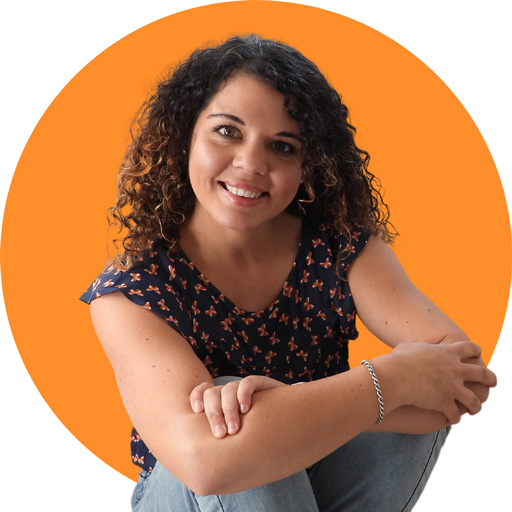
I hope you enjoy reading this blog post. If you want to do my course on how to homeschool, click here.
(If you haven’t taken the Homeschool Style Quiz, make sure you check it out here).
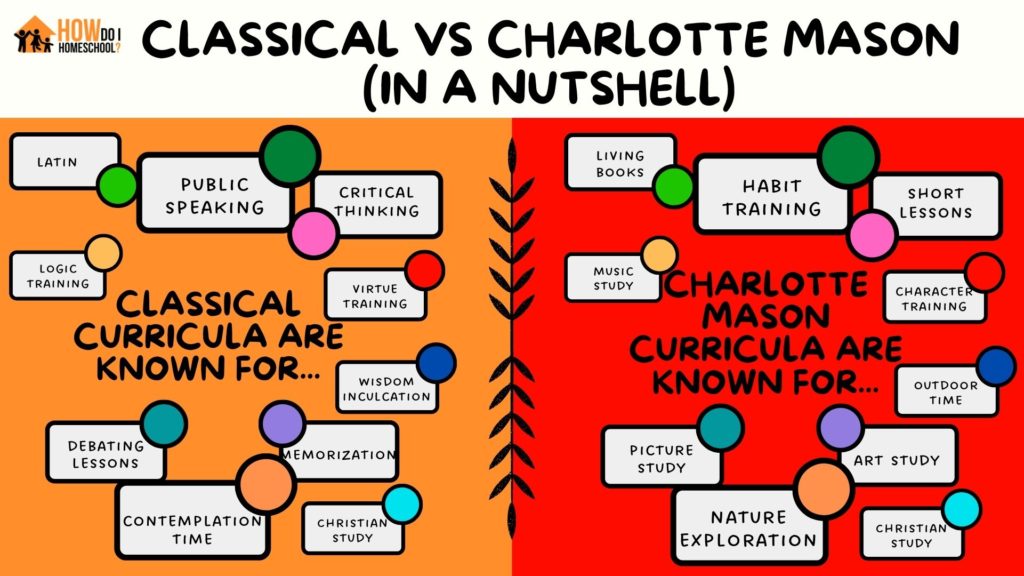
Similarities: Classical vs Charlotte Mason Education
Perhaps Classical and Charlotte Mason education are so similar because Charlotte Mason started her school career as a Classically trained educator.
While Mason valued many things about Classical education, she felt the approach could be too harsh and create too much boredom in students. She felt a gentler approach was needed. Hence, she discarded some elements of the classical system and kept some. She then created her own Charlotte Mason educational style.
Below we’ll discuss some of these similarities between classical vs Charlotte Mason education.
(If you want to watch a quick video on both methods, you can see them here: Classical video; Charlotte Mason video.
Memorization is Valued
It doesn’t sound exciting, but classical educators realized memorization could be exciting for children. But, this is only if you get students memorizing facts at the correct ages.
That is, if children memorize in their elementary years (classical educators call this the poll-parrot stage), they love it. However, if you insist on them memorizing too much during their middle or high school years, they’ll hate the task.
Both Charlotte Mason and classical educators value memorization. This is useful for learning famous passages, valuable quotes, and Bible verses. Both encourage memorization as they see this will stand them in good stead for things they’ll learn in middle and high school years.
Great Literature is Important
Both classical and Charlotte Mason methods encourage students to read widely. Many of life’s lessons should be learned out of the pages of a book. And the best lessons are learned from the best books (the classics).
Mason went a step further and encouraged parents to find ‘living books.’ These are narrative books that engross students while teaching valuable moral, historical, or other educational lessons. (An example of a living book would be Aesop’s Fables.)
Parent-Led Learning
Both methods encourage students to learn a set curriculum of useful grammar, history, and mathematics subjects.
This might be different from an unschooling family where studies are child-led.
In a Charlotte Mason or Classical education, students are directed to learn challenging texts they might not choose if learning were child-led.
However, Mason encouraged children to learn for themselves in some areas, as we’ll see below.
Perfection Encouraged
Classical and Charlotte Mason education always encourages students to produce work of the highest standard. Sloppy writing is stamped out and replaced with elegant strokes.
Spelling mistakes are worked on until students are perfect spellers. Pronunciation is practiced until there is perfect diction.
Differences: Classical vs Charlotte Mason Education
Charlotte Mason kept some elements of a classical education when she created her new homeschooling approach. But, she also discarded components. This left many differences between the styles.
Below we’ll discuss some of these differences between classical and Charlotte Mason education.
Charlotte Mason is More ‘Gentle’
Classical education gives children a curriculum they learn without much deviation. This is irrespective of personal differences between students.
Mason gave her pupils a curriculum, but lessons were much shorter, and parents taught lessons with the specific child in mind. Education was seen as a way of life by Mason.
Mason also didn’t want students struggling through dry textbooks to learn a lesson. Instead, she encouraged a love of living books, which were fun alternatives to the dry textbooks used for many years.
Also, instead of children sitting stressful exams, educators had children tell them what they had learned in the lesson.
Classical Education Gives Children an Excellent Grasp of Languages
It may seem strange to teach children Latin (after all, it’s supposed to be a dead language!), but there is a good reason every child learned it back in Charles Dickens’s time.
Contrary to popular thought, Latin is not dead. Instead, it lives on in all the romantic languages, and if you know Latin, you know at least 50% of English and the other romance languages.
Latin gives students an incredible grasp on English, too, as students don’t need to know every new word but recognize the Latin roots and figure it out quickly. Classical educators realize this and give children a good foundation in Latin in elementary and middle school years.
Classical Education is Made for Classrooms
When there’s a ratio of thirty children to one teacher, exams have to be sit-down. It’s difficult for teachers to test children orally (with narration – see video below). This is because oral testing is too time-consuming in a classroom.
Classical education is made for a classroom situation; Charlotte Mason is more personal and is made for much lower student: teacher ratios. The latter would be almost impossible to do correctly in a large classroom (or, if it were, I believe it would be a butchered version).
Mason Valued Art and Music More
Although both methods value art and music, Mason seems to promote these elements slightly more than classical educators.
Classical Education Starts Earlier
Classical education starts children learning around ages 5. The thought behind this is that parents shouldn’t waste the earliest years.
Charlotte Mason encouraged parents to wait until at least age 6, fearing children might get burned out if they start too early.
Debate is Highly Valued in Classical Education
One of the most significant differences between classical vs. Charlotte Mason education is that argumentation and debate are considered arts that should be highly developed.
While the first stage of classical education encourages fact learning, the second stage is primarily devoted to learning the art of logic and argumentation. The third stage of education teaches children to debate graciously and winningly.
Debate and logic are less practiced in a Charlotte Mason education.
Retelling Material Encouraged in Charlotte Mason Education
Classical Education involves parents in explaining subjects more. Charlotte Mason homeschooling leans heavily on verbal narration (the child retells the summary of a story after hearing it to make sure they’ve been listening).
Nature Engagement
Perhaps the most significant difference between classical and Charlotte Mason education is nature engagement.
Classical education doesn’t encourage much engagement with nature. In contrast, Mason believed nature is a great teacher. She thought children should spend plenty of time in the yard, on field trips, or picnics. These opportunities allow students to notebook and take down their observations. They can learn the names of trees, insects, bushes, and animals. They can sketch these objects and learn about the seasons.
Mason also believed that getting children outside was good for their muscular development and mental health. A field trip could be a lovely, educational, stress-free day for the whole family.
Charlotte Mason vs. Classical Education Videos
The two videos below look at the Charlotte Mason and classical education approaches. Take a listen.
The Principles of Charlotte Mason vs Classical Education
Charlotte Mason and Classical education have principles that have been developed over time. You can look at them here:
- Charlotte Mason principles (written by Charlotte Mason)
- Classical Principles
These principles give you an accurate snapshot and help you understand these two methods without reading enormous books about these methods.
Charlotte Mason and Classical Curriculum Programs
There are lots of Charlotte Mason and Classical curriculum programs available today.
If you love the:
- Charlotte Mason method check out the Heart of Dakota curriculum
- or look at a full list of Charlotte mason curricula here
- Classical method check out Memoria Press
- or look at a full list of Classical curricula here
I hope that’s helpful 🙂
Want to Learn How to Homeschool?
There are two great ways t learn more about homeschooling: one is free, and one is a $67 fundamentals course.
The $67 Course
Looking to take your homeschooling to the next level? Join Rebecca Devitt’s online Homeschool Parenting Program and learn the strategies and techniques needed to make homeschooling a success! Learn more about the HPP here and signup here.
The Free Youtube Channel
Also, make sure you join the How to Homeschool Youtube channel, which will give you a fun and exciting look into the homeschool world and help homeschool your children. Check out the channel here, and don’t forget to SUBSCRIBE.
If you’re not sure where to start, start with the following playlists:
- Starting homeschool playlist
- Homeschool Methods playlist
- Homeschool Curriculum playlist
- FAQs on Homeschooling playlist
You’ll love it and find it helpful and entertaining! Discover the channel here.
Conclusion
Classical vs Charlotte Mason education. Which shall it be? After writing and researching both methods, I’m still as undecided as before. I’m a fan of debating, logic, and the excellent basis for the English language. This type of education gives children in classical education. On the other hand, I like the thought of living books instead of dry textbooks, nature engagement, and narration. What about you? Which do you prefer and why? Comment in the section below the video.
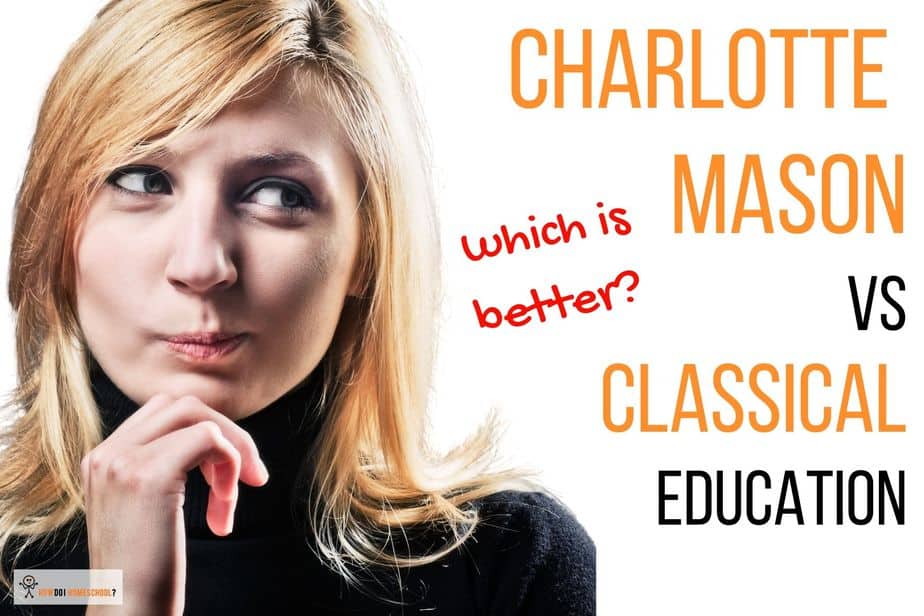
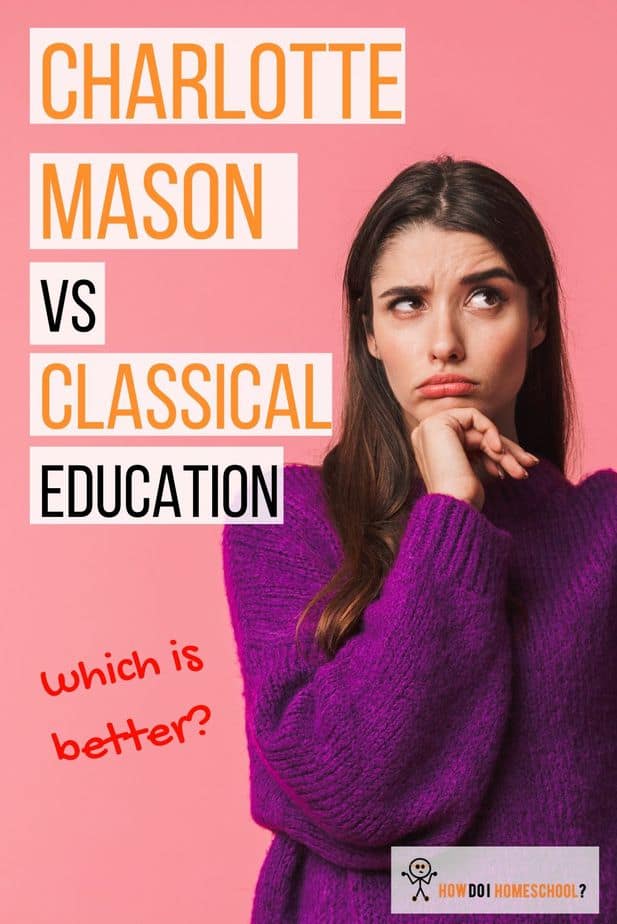


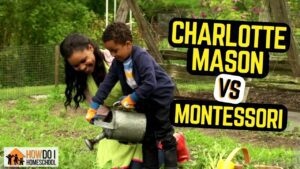
Learn more
I have a 7 year old male grandchild who is currently at Check Elementary school in Check , Va. I would like to teach him in an after school setting using a Charlotte Mason and classical Christian Curriculum. Any suggestions!
Absolutely! There are a number of eclectic homeschool programs out there which try to use these two methods. One popular one at the moment is My Compass Classroom which is a mix between Classical and Charlotte Mason methods. It’s very much so a Christian program.
Hi there – it seems every various homeschool google search I do lands me on your website! I have so appreciated the time you’ve taken to share this information. I see you recommended a curriculum that blends Charlotte Mason and Classical. Are there any others you might recommend? Do you have any opinion on Classical Conversations? I am really struggling on choosing between CM and CE!
Hi Jennifer. Thanks for your comment. I appreciate you taking the time to write it. I like Classical Conversations, but they seem to be quite clicky from a lot of the comments I’ve read. It seems you either love it or hate it. I feel I’d probably like to join it if I had that community around me. So, go for it!
Yes, I like both Classical and Charlotte Mason. I’m quite eclectic that way.
You should look into My Father’s World which is a bit of a favorite. There is also Tapestry of Grace.
Hope that helps.
Bec